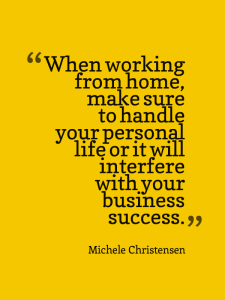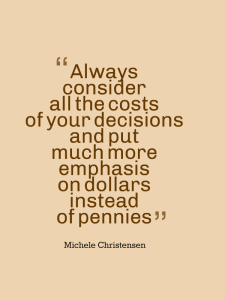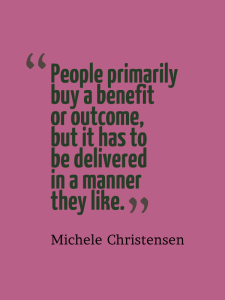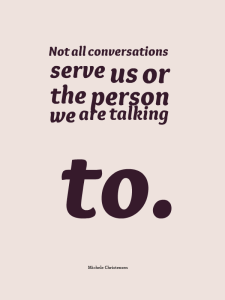 I’m celebrating this week and won’t be doing a blog post. I hope you’ve had a great week and see you next week!
I’m celebrating this week and won’t be doing a blog post. I hope you’ve had a great week and see you next week!
Author: Michele
3 Tips for Keeping Your Personal Tasks from Ruining Your Business
One of the best things about working from home is that you can take care of chores and personal tasks whenever you want, even while you are working. One of the worst things about working from home is that you can can take care of chores and personal tasks whenever you want, even while you are working. 🙂
worst things about working from home is that you can can take care of chores and personal tasks whenever you want, even while you are working. 🙂
Having no clear boundaries between work and personal tasks can mean that the two tend to blur, and this can be great until it begins to cause problems. Sometimes it gets really hard to leave personal tasks undone and focus on the business. After all, if you are home all day why isn’t the house perfect, the papers filed, the fridge stocked, the mail sorted, the calls made, etc.?
I’ve found that if I don’t watch it, that my personal tasks can start to erode away valuable time spent on my business which can be detrimental. I’ve found a few ways to keep the personal tasks from expanding too much, and so I have 3 tips for you that will help keep those annoying personal tasks at bay so you can focus on your business.
- Create systems for things that pile up and nag you. For me, the worst offender is the mail. For an unknown reason, we get huge amounts of mail that needs to be dealt with. I did all the recommended steps to cut down on the mail, and still it regularly piled up. What I finally did was designate the first 15 minutes of every day to deal with the mail. Finally, this has gotten the accumulation down and keeps in check over the long haul. If your nagging, piled up task is laundry then find a way to fix it – designate a day, do a load every morning, send it out or go to a laundromat for a big session monthly. If it’s yard work, do some every day to wake up when the afternoon lull hits, hire someone to do it, or take an afternoon every other week. The point is, create some system for whatever your worst offender is so that it doesn’t nag you anymore.
- Designate time to crank out personal chores. Trying to do chores in small bits of time leftover from other activities often doesn’t work. You need time to get into something and finish it. If you only have 2 minutes, that rules out most tasks you could even thing about doing because it’s not enough time. If you start with half an hour, that’s enough time to not only start but finish many household tasks. I set aside some time right after lunch every day and just crank through the top few pressing things I need to do.
- Find your mental and physical productivity times. When are you at your best mentally? How about physically? Schedule tasks in a way that takes advantage of these times. If you’re a night owl, can you arrange you schedule to get some turbo-charged time late at night? If you have loads of energy for physical tasks in the morning, use that time to get them done.
I used to think that having a successful work-at-home business was only about being a good business person. Now I know you have to manage your personal life well too.
How do you keep your personal life from ruining your business? Share your tips in the comments.
Penny-wise and dollar-foolish
 Have you ever heard this expression: “penny-wise and dollar-foolish?” It describes being wise with small amounts of money but foolish with big amounts. I heard a story recently that reminded me how easy it is to fall into this not only for solopreneurs but for big companies as well.
Have you ever heard this expression: “penny-wise and dollar-foolish?” It describes being wise with small amounts of money but foolish with big amounts. I heard a story recently that reminded me how easy it is to fall into this not only for solopreneurs but for big companies as well.
A friend of mine was traveling with his girlfriend and two dogs. They arrived at night at a big, chain hotel and took a room for the night. They didn’t know the hotel allowed dogs and so the dogs slept in the car (it was safe, near their room and the temperature was fine). The next day, as they were browsing the web to find a hotel for the next night, they found that the hotel they were in did in fact allow dogs so they let the dogs in for about 5 minutes before getting a call from management.
The concern of management was that while the hotel did take dogs, my friends were in a room that was not part of the hotel where dogs were allowed and they had not paid the pet deposit upon checking in. Sounds reasonable so far, right? The problem was that the management took a combative and accusatory tone from the beginning. They insisted my friends tried to bilk them and had broken the rules on purpose. The management also insisted upon a penalty fine of hundreds of dollars instead of just the $40 or so it would cost to deep clean the hotel room. My friends offered to allow an inspection and offered to pay for the deep clean. The hotel refused and wouldn’t even come to the room to look. My friends paid the penalty, resumed their trip and have told a lot of people about this experience.
Here is a perfect example of penny-wise and dollar-foolish. The hotel management staff were so intent on getting the few-hundred dollar penalty that they lost not only all future business from my friends but also that of the many people they told. Had they been gracious and just took enough money to make sure they weren’t out of pocket, my friends and all of their dog-loving friends would now be fans of this hotel.
There’s loads of other ways to be penny-wise and dollar-foolish. Do you alienate customers and lose big sales over small money? Do you buy the cheapest version of products or services and end up wasting precious hours because of it? As an solopreneur, it could kill your business to think this way. Always consider all the costs of your decisions and put much more emphasis on dollars instead of pennies.
Have you ever caught yourself being penny-wise and dollar-foolish? How did you fix it? Share your experience in the comments.
What people buy
 If you’re a sales expert, this will probably be review for you. I’m going through a training right now, and the whole idea of what people actually buy has been covered a lot. I’ve heard a lot of this before, but as with a lot of educational material it sinks in differently the second time around so I have some new ideas.
If you’re a sales expert, this will probably be review for you. I’m going through a training right now, and the whole idea of what people actually buy has been covered a lot. I’ve heard a lot of this before, but as with a lot of educational material it sinks in differently the second time around so I have some new ideas.
Features vs. Benefits
This was a really eye-opening concept to me the first time I heard it, and I continue to deepen my understanding of this idea. Features are facts and data about the product or service, e.g. “This laptop weighs 1 pound.” The benefit would be something like “Light enough to carry around all day without fatigue.” See the difference? I don’t care exactly what it weighs, but I do care that I can carry it around. Here’s another example: “This car has a turning radius that is 20% smaller than other cars in it’s class.” The benefit could be something like “Able to squeeze into tight parking spaces passed over by other cars.” Car stats bore me, but I live in LA so being able to have more parking spaces available is a huge benefit for me.
Delivery
Now that you understand the difference between features and benefits, it’s important to talk about how you deliver those benefits. If your benefit is a reduction in body fat, how do you deliver that result? Is it a one-on-one fitness training program? Is it a food delivery service? A boot camp? A supervised diet? There’s lots of ways to deliver this benefit.
The trap is that it’s easy to talk about delivery and so we tend to focus on that instead of what people will get out of what you are delivering. It’s easy and concrete to talk about 6 sessions, an e-book or a box of printed material. We are also familiar with how we do what we do so it feels comfortable talking about it. It’s also a way to duck out on having to share what results people get from working with you.
A lot of sales experts say that people don’t care at all about how the result is delivered and that they care about the results you can get for them. I agree to some extent with this idea, but I differ in the degree. People do care about how you deliver, just not as much as they care about the results. I think it’s too black-and-white to say they don’t care. Some people hate the telephone, some people don’t want to travel and some people like to read their information. Other people may want premium level one-on-one service.
What people buy
So what do people actually buy?
Primarily it’s the benefit or result, but in order for them to actually buy it has to be delivered in a way they find appealing or at least acceptable. Don’t fall in the trap of talking too much about how you deliver, but don’t ignore delivery either.
What’s the benefit of one of your products or services? How do you deliver that benefit? Tell me about it in the comments.
People to avoid
I was out socially during a recent weekend, and found myself talking business with some people that I didn’t know well. One of them was a very negative, naysayer,  “can’t be done” kind of guy. He was the kind of person who feels like nothing in his life is in his control – whatever happens in his life happens to him not ever because of anything he did.
“can’t be done” kind of guy. He was the kind of person who feels like nothing in his life is in his control – whatever happens in his life happens to him not ever because of anything he did.
Because I’m so passionate and excited about my business and I love the people I work with, I got very excited to be able to talk business with new people. The more I described all the good things that come from my business, the more negative he got.
He also had a way of thinking that is like nails on a chalkboard to me – he made up his mind before having any data, and no amount of evidence to the contrary would sway him.
Later, I realized I wasted a lot of energy trying to share my excitement with him. He’s negative and has no sense of being responsible for his own life. He has no interest in learning new things or expanding what he knows of the world. In short, he was a fool in this respect and I wasted my time, energy and enthusiasm on him.
I can’t go back and get a do-ever on this one, but I resolved right then and there to be done with having this kind of conversation with this kind of person. It left me drained and frustrated, and left him no more informed than he had been before.
Sometimes, when you have a mission you want to share it with the world. I know it takes almost nothing to get me talking about work. The thing is, not all conversations serve us or the person we are talking to. In this case, neither of us got anything out of it.
Your time and energy are precious resources and the source of all you business success. Use these resources well even when you are not working. They are very limited, and you can’t get them back. Don’t waste any time or energy on any activity that doesn’t provide a return of some sort. The next time I feel myself being frustrated instead of feeling connected in a conversation I’ll stop the interaction.
What kind of people drain you? How do you know when to leave a conversation? What kind of limits do you set in this area?
Do you have a business or just a product or service?
Do you have a business or just a product or service? What’s the difference?
I have this conversation often with people in one form or another. One of the biggest misconceptions about starting a business is that all you have to do is be great at making your product or delivering your service and you will have a profitable business. If you’ve had your business for more than a few months, you already know this isn’t true. Granted, having a great product or service is probably the single most important part of having a successful business but it is far from the only part. Since I began my business, I’ve changed how I describe what I do because I began to realize that most non-business owners don’t know that there is a lot to do to build a business that has nothing to do with the product or service you offer.
A business is an organization or structure dedicated to selling one or more products or services. A product or service is what a business sells.
Example: A person could be a dog walker, and offer only that service to whomever happens to find them. In contrast, a person could have an entire business built around the basic service of walking dogs. They could have business cards, a brochure and website. They have various packages and payment options. They could promote by speaking, exhibiting at events and by posting on social media.
A business has lots of parts that work together. There are people, areas of knowledge, equipment, physical places, and intangibles like brands or expertise. Early economists called these factors of production, which consisted of land, labor, capital and entrepreneurship.
A business has processes and ways of doing things.
Example: How are new customers signed up? How are customers billed? How are the finances monitored?
A business has various roles people play, even if the roles are all played by one person in a solopreneur business.
Example: In the dog walking business, there is the person or people who actually walk the dogs, the person who does the scheduling, the person who books the appointments, the person who handles paperwork and bookkeeping and the person who promotes the service.
A business engages in promotion and marketing in order to sell the product(s) or service(s) it provides. Part of this promtion is educating customers so they can decide if they want to buy.
A business has proprietary knowledge about how it does things that distinguish it from other businesses that sell the same things. If this is relevant to customers, the business must make sure customers know about it.
Example: I saw an ad recently for a guy who takes small groups of dogs on hikes into nearby nature areas. Technically, he is a “dog walker,” since his basic service is picking the dogs up and getting them out of the house for an outing, but his way of doing it is very different than the typical dog walker and his marketing materials show this difference clearly.
Which do you have: a business or just a product or service? If you see yourself as having just a product or service but want to move up to a full-fledged business, contact me for more information.
Get creative in meeting your customer’s needs
 In my last two posts (here and here), I shared some of what I learned at the Overnight Authority event with Adam Urbanski earlier this month. Today’s post is an expansion on one big thing I learned during a sales exercise we did in the workshop.
In my last two posts (here and here), I shared some of what I learned at the Overnight Authority event with Adam Urbanski earlier this month. Today’s post is an expansion on one big thing I learned during a sales exercise we did in the workshop.
One of the points that was made during the introduction of the exercise was that our goal was to make a sale. This was a real sales situation, and even though it was an exercise we were obligated to deliver what we sold and pay for what we purchased during the exercise. We could sell anything we could offer that the other person wanted to buy. That opened up all sorts of possibilities such as selling something that you had never sold before, selling something you created on the spot, or selling something completely unrelated to your business. That was really the first lesson of that exercise – if you can help someone or provide something they need and they want to buy it, find a way to deliver it! Don’t let formalities get in your way.
There was no way to get prepared for this exercise, so I didn’t have any of my usual materials in front of me. I was forced to get creative in offering something for sale since I didn’t have any of my packages or products listed in front of me. I listened to my prospect describe her problems and then created something on the spot that I could deliver that I thought would solve her problem. In a way, it was better that I didn’t have my own materials to work from because I was forced to listen and create something that fit rather than try to fit the customer into my pre-defined pacakges.
People really took this and ran with it. One person offered a package that was turned down by her prospect, and she then offered one tip for $25 which was accepted by the happy customer. Another person created a package for her prospect that was something she could do but had never thought to offer in her business because it wasn’t part of her main work. I offered something that I had been thinking about for a while but couldn’t quite put together until I was under fire to do it.
The really big takeaway for me was that yes, it’s great to offer a range of products and services in pre-set packages but it’s also great to wing it when you have the chance to make a sale outside of those packages. Don’t let the fact that they don’t fit a pre-set offering cause a customer you could help slip away. It’s a disservice to you and to the customer.
Aside from just generally thinking differently about creating things to offer for sale, one way I’m going to implement this idea is to be more proactive at offering to create a custom package for someone who I want to work with. If they want to work with me and the issue is simply that I don’t offer a service package that appeals to them, I’m going to ask them “What kind of package would work for you?” and see if we can make it happen.
How can you be more creative at finding ways to offer what your customer wants? Have you ever created an offer on the spot? How did it work? Tell me about it in the comments.
How to Ditch the Overwhelm!
I’ve got something new to share with you!
You know how entrepreneurs spend a lot of their time feeling overwhelmed? By nature, entrepreneurs love ideas. We can come up with them in our sleep – and often do! Most of us have more ideas than we could get to in a lifetime. So what’s the problem?
Well, entrepreneurs also commonly suffer from “bright, shiny object syndrome,” or the tendency to get bored with something before it’s done and jump to the next thing that we’re sure will make us a smashing success.
What happens when an abundance of ideas and bright, shiny object syndrome collide? Lots of things – low income, scattered focus, dissatisfaction with the business, and perhaps the biggest problem:
Overwhelm!
Overwhelm happens when we have too many things going at once and there’s not only more than we can do but more than we can even keep on top of. It’s like a business treadmill – you are running harder and harder but not getting anywhere. It’s impossible to figure out what to work on and you aren’t making the money you want.
The good news is that there is a quick fix! I can help you Ditch the Overwhelm, get focused and get moving toward making profit quickly with a step by step plan.
We’ll work together to figure out what’s the best thing for you to do right now and create a step by step action plan so you know how to move forward. At the end of our short time together, you’ll be clear about what to do first, how to do it and how it will lead to profit.
Sound great? Click here for details, and I hope to help you Ditch the Overwhelm soon!
PS – This program is only available until the end of May, so if you’re interested check it out today.
Sales lessons from a hard exercise
 In my last post, I mentioned that I had been to a live training earlier this month with Adam Urbanski called Overnight Authority. I learned so much there that I have several posts lined up and this is the next in the series.
In my last post, I mentioned that I had been to a live training earlier this month with Adam Urbanski called Overnight Authority. I learned so much there that I have several posts lined up and this is the next in the series.
One night of the workshop we had a bonus session that included a sales exercise. A big part of what I learned at the workshop is that sales is what makes a business. All the other things you do serve only to make sales possible and/or more likely. Sales is a real challenge to many solopreneurs because we love what we do and really want to help people. We’d do it for free if we could! But the truth is, without a sale you can’t help anyone. All of the greatness you have to offer is wasted if nobody buys it.
In the first part of the evening, we learned some of Adam’s techniques on consultative selling which is a way of conducting the sales process as a consultation not as a hard sell. Then, we did the next logical thing which is to pair up and try to sell each other something! Gulp. The thing was, this was not a role playing exercise this was for real! If you sold something, you had to deliver and the other person had to pay. There were also no requirement that what you sold had to be something you already offer or even something in your business.
What was hard for me is that when I have a one-on-one sales conversation I go in prepared. I’ve asked a few questions already and have looked at the person’s website. I also have all of my own material – prices, terms, etc in front of me for easy reference. In this conversation, I was totally unprepared! I have to say, I really didn’t want to do this exercise but I had already entrusted Adam with my time and investment so I trusted him here as well.
Here are 3 big lessons I learned from that exercise. Just for the record, I’ve already shared everything with the other people mentioned because it was a learning exercise.
- If your prospect says you don’t understand don’t argue! When I was the prospect, my seller argued with me in this manner and all it did was make me dig in even further and argue back even harder. It completely shut off any possibility of us getting to an understanding. It felt condescending and frustrating, especially when the answer I got was way off base from what I wanted to communicate. At this point, my thinking is that if your prospect says you don’t understand, the only logical answer is something like “Can you help me to understand better?”
- When you are selling, don’t be too attached to making a sale. I’ve heard several sales professionals say something like “Be committed to helping them make a decision, but not what that decision is.” This feels really good to me and I try to do it. When I was the seller, I felt close to making a sale at one point and got a little too over-eager and started spewing words out. When I was the prospect, I sensed this from my seller and it made me not want to buy anything that might be offered.
- Finally, don’t be afraid to wing it! If someone is sitting in front of you with a problem that you can solve and they want to hire you, find a way to make it work. Lots of people in the room made sales that night of things that didn’t even exist when the exercise began. Create a package on the spot or do something unconventional. Don’t let a chance to serve someone else get away because you don’t have a package that fits.
What is your favorite piece of sales wisdom? How did you learn it? Tell me about it in the comments.
My top ten takeaways from The Overnight Authority Live Event
Last week, I attended a training given by Adam Urbanski called The Overnight Authority Live Event. It was an intense, demanding 3 days but I learned a lot. Not  only were there strategies and tactics, but there was a lot of new ways of thinking presented which was the most helpful part for me. By “new ways of thinking,” I don’t really mean mindset, which is also important, but a new way of looking at how you do business that is focused on accomplishing important things quickly. I have lots more to share from the event and in fact have a few blog posts lined up already, but for today I’ll wet your appetite with just my top ten takeaways from the event:
only were there strategies and tactics, but there was a lot of new ways of thinking presented which was the most helpful part for me. By “new ways of thinking,” I don’t really mean mindset, which is also important, but a new way of looking at how you do business that is focused on accomplishing important things quickly. I have lots more to share from the event and in fact have a few blog posts lined up already, but for today I’ll wet your appetite with just my top ten takeaways from the event:
- Spend less time creating things to sell and more time selling them.
- If something doesn’t work or sell well the first time around, instead of scrapping it and starting fresh, see if you can try again and tweak what you did. This is a shift for me because although I live by “test and revise,” I think I’ve been too quick to say something didn’t work and needed to be scrapped.
- Don’t be afraid to wing it. If there’s a customer in front of you that wants to buy something you don’t currently sell but can provide, find a way to make a deal.
- Don’t be afraid to ask. If you don’t ask you’ll always get a “no,” if you ask you may get a yes or a no but the worst possible outcome is that they say no.
- Don’t think first of cutting prices, think first of how to deliver more value so you can charge the price you want.
- Having something for sale is useless unless people need it and know they need it.
- Connect regularly with successful business owners and continue your own development.
- If you refuse to stop you cannot fail.
- There’s a lot of things that a lot of experts will tell you that you “have to” do. They are not always right.
- Don’t let fear of looking stupid or fear of what other people might think stop you or even influence you.
What’s your favorite idea here? How did you learn it? Tell me about it in the comments.

